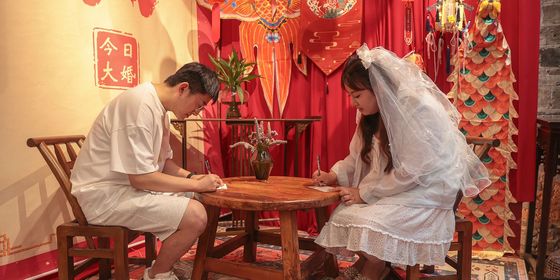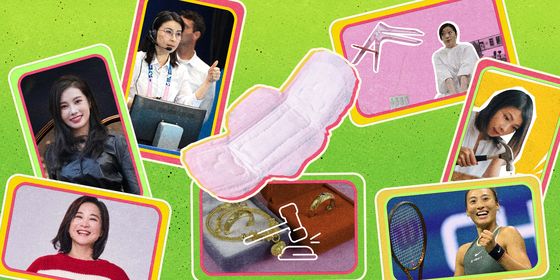TWOC presents the most desirable types of Chinese man and those opposite ones
Drawing from recent reportage, surveys, polls, and our own observations, The World of Chinese presents some of the most desirable types of Chinese man—plus a few stereotypes women would like to do without.
What Women Want
The Overachiever 学霸
He might not be the most handsome or charismatic guy, but he is super smart. Who knows? Maybe he might end up the next head of Baidu, like Robin Li! (But hopefully not the next Richard Liu, the JD.com chief recently arrested for sexual assault).
A generation ago, the overachievers would have probably ended up on a farm or factory line, but now he tests so well in the gaokao that he earned a place at one of China’s top universities, the alma maters of several members of the Politburo.
After graduation, he either went straight into a high-paying job in the IT or financial sector, or is still pursuing his master’s or PhD. Confucian ethics run deep and education is still a measure of a man’s worth, so he will instantly win the approval of prospective parents-in-law.
Economic Man 经济适用男
Named after the government’s affordable housing program, the “Economic and Applicable Man” concept is a simple one: Just as not everyone can afford their ideal apartment, not everyone can end up with the man of their dreams. Therefore, a single woman should strive to be practical when it comes to finding a husband—at least, according to the 2010 book Marry an Affordable Man.
The “Economic Man” is an average-looking guy with a gentle personality and traditional values. He has a stable job and gives all his salary to his wife. He never smokes, drinks, or gambles, nor has any “dangerous” female friends. He takes care of the family and is filial to his in-laws. He may not make anyone’s heart race, but at least you know you will have a stable life with Mr. Economic.
Warm Man 暖男
Being with a “warm man” is comparable to enjoying a warm spring day. A warm man cares deeply and devotedly. He listens to women and seems to understand. But make sure he’s not a “central air conditioner,” which means he’s nice to everyone, not just you. A warm man cooks for you and does the housework; he gives you a foot massage after a long day; he packs an extra sweater in your purse because it’s cold outside; he’s like your favorite unpaid butler. Warm men aren’t always the richest or the most handsome, but they put you first.
Civil Servant 公务员
It is a truth universally acknowledged that a single man holding a government position must be in want of a wife. An “iron-rice bowl” job is still a plus in the marriage market, especially in smaller cities. For some parents, an eligible civil servant is the ideal match for their daughters: He belongs in the system and will probably never lose his job. Sure, his income is average, but who knows how many hidden “perks” he receives?
If finding a partner is all about careful screening, the civil servant is not a bad choice—after all, over two million people took the civil servant exam last year and only one-sixteenth passed.
What Women Don’t Want
Greasy Guy 油腻男
If he’s toting a clunky gold neck-chain, prayer beads, and a hot-water flask filled with red dates and goji berries—be careful, this man might be youni (“greasy”). If he favors wearing long johns around the house under a bulging gut, though, it’s probably already too late.
The weisuonan (猥琐男 “sleazy man”) has been around for decades, blissfully unaware of his own creepiness. Perhaps the recent rise of the less alarming man’s counterpart—the overly primped “little fresh meat”—prompted the need to rename this familiar figure.
Aging writer Feng Tang, who popularized the plight of the youni in a 2017 essay, “How to Avoid Becoming a Greasy, Dirty Middle-Aged Man,” offered a number of pointers to avoid greasiness: “Never talk down to the younger generation”; “Never stop buying.” Unfortunately, these have been mocked as being precisely the things a weisuonan would do, such as humble-bragging and trying to appear “down” with millennials.
Age is no barrier to being a greaseball—overly confident young actors like Yang Yang and Yang Shuo are regularly accused of greasiness—nor is gender: Gossipy older women who obsess about yoga, cosmetics, and the need for a better apartment also belong in the grease bucket.
Phoenix Man 凤凰男
Surveys on dating sites consistently suggest one of the least popular stereotypes is the self-made or “phoenix” man. Referring to the idea of “a phoenix that soars out of a chicken coop,” this is an ordinary man who grew up in the countryside, but worked tirelessly to get a good gaokao result and perhaps eventually a high-level executive position in the city. So why is the destiny-changing phoenix man not respected for his hard work and enterprising nature?
The answer lies in his rural roots—which make him particularly unpopular with middle-class urban “peacock girls” (孔雀女). The idea, depicted in TV shows like Double Sided Adhesive Tape and New Marriage Age, is that the “phoenix” will have exhausted his entire family’s finances in his quest for upward mobility; in turn, the family will have pinned all their hopes on his success, and expect him to provide for them. The phoenix man will therefore prioritize the needs of his extended family over his partner, who will be expected to comply with the family’s customs, culture, controlling ways, and demands for money. Urban parents may find their rural in-laws irritating and unsophisticated, or fear that their daughter will end up acting as her new family’s unpaid servant.
In addition, phoenix men are accused of having a range of insecurities, such as being controlling over their wives’ social life and friends, fear of failure, and being miserly about money due to having grown up poor.
Ancient ideals
While the modern male ideal ranges from successful businessman to family guy, the epitome of ancient Chinese masculinity was more specific—a junzi (君子, “superior man”). The term originally described a nobleman—literally, “son of a lord”— during the Western Zhou dynasty (1046 BCE – 771 BCE), but later described virtuous men who fulfilled Confucian obligations.
While still one rank below the supreme honor of sage, ancient junzi were the epitome of both high morals and talent. Late Qing dynasty scholar Gu Hongming (辜鸿铭) believed that the essence of Confucius’s philosophy was “the doctrine of junzi.” A junzi possesses the virtues of benevolence (仁), righteousness (义), propriety (礼), knowledge (智), and integrity (信), and follows the tenets of loyalty (忠), filial piety (孝), and honesty (廉). In his Analects, Confucius mentions junzi 107 times (referring to rulers in a dozen instances) and its opposite, xiaoren (小人, “inferior person”), 24 times, claiming “The mind of the superior man is conversant with righteousness; the mind of the mean man is conversant with gain” (君子喻于义,小人喻于利). Since the Zhou dynasty, students were encouraged to become junzi by mastering the “six arts” (六艺): rites, music, archery, charioteering, calligraphy, and mathematics.
Junzi dos and don’ts
- Do honor your father and mother
- Don’t borrow your father’s horse without asking
- Do maintain a prosperous and harmonious household
- Don’t spend all your time with the concubines
- Do obey the emperor
- Don’t agree with everything he suggests, then switch sides when the dynasty falls
What Women Want/Don’t Want is a story from our issue, “The Masculinity Issue.” To read the entire issue, become a subscriber and receive the full magazine.













